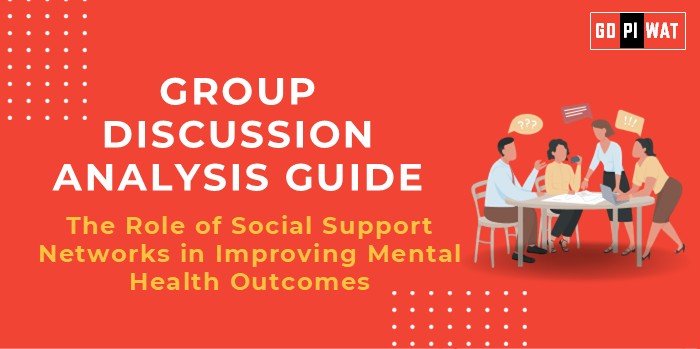📋 Group Discussion Analysis Guide
🌐 The Role of Social Support Networks in Improving Mental Health Outcomes
📝 Introduction to the Topic
Opening Context: “In a world increasingly characterized by isolation and stress, the importance of social support networks in enhancing mental health cannot be overstated. These networks offer emotional, psychological, and practical help, significantly impacting individual well-being.”
Topic Background: Social support networks, comprising family, friends, community groups, and professional organizations, play a crucial role in mental health care. Modern psychology recognizes them as vital buffers against stress and critical components in recovery. With the global rise in mental health disorders, harnessing these networks is more essential than ever.
📊 Quick Facts and Key Statistics
- Mental Health Disorders Worldwide: Affect over 1 billion people (WHO, 2023).
- Social Support Impact: Reduces the risk of depression by 48% (Lancet, 2023).
- Economic Benefits: Strong networks save $210 billion annually in mental health care costs (OECD, 2023).
- India’s Concern: 7.5% of its population suffers from mental disorders, with gaps in treatment.
👥 Stakeholders and Their Roles
- Government: Policy formulation, funding support groups, and integrating mental health into public health systems.
- NGOs: Advocacy, grassroots support, and community-level interventions.
- Healthcare Providers: Offering therapy, workshops, and building community networks.
- Community Groups: Peer-led initiatives that foster a sense of belonging.
🎯 Achievements and Challenges
- Achievements:
- Increased Awareness: Campaigns like WHO’s Mental Health Awareness Month.
- Helpline Success: India’s 24/7 mental health helpline has handled 1.5 million calls since 2021.
- Community-Led Models: Programs like “Together for Mental Health” in Kenya show a 60% improvement in patient recovery rates.
- Challenges:
- Stigma: Societal stigma prevents 70% of those affected from seeking help.
- Access Gaps: 80% of people in low-income countries lack mental health services.
- Over-Reliance on Informal Networks: Often untrained to deal with complex issues.
🌍 Global Comparisons
- Japan: Focuses on technology-enhanced social networks for elderly mental health.
- Australia: “Beyond Blue” campaign integrates mental health into all facets of society.
📄 Case Studies
- Kerala, India: Community-based mental health initiatives reduced suicide rates by 20%.
📋 Structured Arguments for Discussion
- Supporting Stance: “Strong social support networks are essential to improving mental health outcomes, as seen in countries with integrated community mental health models.”
- Opposing Stance: “Without professional mental health services, over-reliance on informal networks risks ineffective care.”
- Balanced Perspective: “While social networks are invaluable, their success hinges on complementary professional and governmental support.”
🗣 Effective Discussion Approaches
- Opening Techniques:
- Statistical Start: “1 billion people globally face mental health issues, but strong social support can halve the risk of depression.”
- Problem Focus: “Despite their importance, 80% of the global population lacks access to robust social support networks.”
- Counter-Argument Handling: “Acknowledging the lack of formal services, we should explore how informal networks can bridge gaps with proper training and resources.”
🔍 Strategic Analysis of Strengths and Weaknesses
- Strengths: Cost-effective, reduces stigma, proven efficacy in prevention.
- Weaknesses: Lack of training, risk of misinformation, scalability issues.
- Opportunities: Collaboration with healthcare systems, digital support platforms.
- Threats: Stigma and cultural resistance, underfunded initiatives.
🎓 Connecting with B-School Applications
- Real-World Applications:
- Case studies in organizational behavior on fostering workplace mental health.
- Project themes exploring scalable community interventions.
- Sample Interview Questions:
- “How can businesses support employees’ mental health through social networks?”
- “Evaluate the effectiveness of grassroots vs. institutional approaches in mental health care.”


